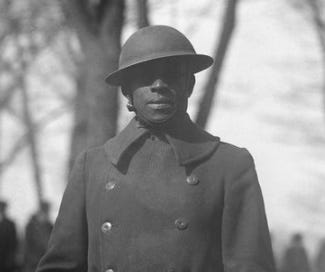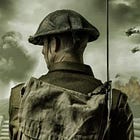The Archivist Papers (Ch12)
Chapter 12 of Theda's Time Machine. Dr. Andersen surprises Conlin by knowing where Theda is...but how could he know when he's dying?
Need a catch up? Here’s the last chapter:
Patrick Conlin exhaled, his breath fogging the boarding house window. He ran his fingertips over the glass, cutting four paths like cat claws against a tree. Somewhere distant a chapel bell chimed for seven o’clock and with it the darkness had fully replaced the last of the visible sky with a swath of stars. Electric lighting flickered on at various intervals: first from the theater, then the street lamps and finally the large building at the end of the block where an entertainment event was gearing up.
From his window perch, Conlin watched as dress uniformed men swarmed in and out of that building, hauling musical equipment from the open back of a Packard truck. For a short but wonderful moment, one of the musicians stood at attention, saluted the sky and blew into his horn, tooting the first bars of The Stars and Stripes Forever. Conlin’s throat tightened and he let his eyelids close, seeing his old friend, Johnny Sinclair, knock out the same tune but on the sax while girls in high hair and saddle shoes whirled with their soldier boyfriends at a USO dance. He opened his eyes and imagined the glass panes as a barrier to another dimension; on the other side the people, the cars and the buildings were not real, only pictures against a thin layer overlayed on the true time of 1946. He wondered if it were possible to will himself home, without going through the steps he and the doctor had taken to get here. He wondered, and not for the first time, if at the end he would simply go crazy.
The shops window lights flickered off one by one as the keepers locked up, shook doorknobs one last time and hit the sidewalks in buttoned up overcoats. A gust of wind plucked the hat from a soldier and tossed it down the street, forcing the young man to run it down while his posse waited, hunching against the cold, gloved hands protecting their own hats.
Dr. Andersen coughed and Conlin cringed, closing his deep brown eyes so the long dark lashes brushed his cheeks. The radiator clicked and hissed, spreading the sour, sick odor emanating from the dying doctor’s body.
“Patrick,” the doctor’s voice was soft. He’ll go any minute now. Then what am I going to do?
“Yeah, Doc?”
“Help me up.” Faint rustling of bed sheets.
“You need the toilet?”
“We need to leave.” Feet on the ground.
Conlin turned, and the room was small enough that he was able to reach over and take the doctor by under his arm. “You can’t go anywhere, Doc,” he said gently. “You’re weak as a baby.”
The doctor’s head hung, and Conlin noticed the stark white hair over the pink scalp. A wave of pity settled in his chest and he was reminded of the old people in his life…his beloved grandmother, his father…who morphed from robust, healthy humans into withered versions of their former selves. His granny’s brown skin wrinkling like paper, and his dad, who could lift a pile of wood in one arm and swing a young Patrick around with the other, finally showing silver shot through his black hair, his livery uniform hanging loose when his muscles began their slow retreat.
The doctor’s breathing sounded like he was taking his air through a straw reed. This man gave himself an illness in order to see if a shot worked to cure it. It didn’t. He sacrificed himself. And now what? I’m to find this Thrax by myself? I’m to take on what is going to happen here by myself? No. When this poor man goes, I’ll turn and head back to New York. There’s nothing more I can do here.
The doctor raised his head. “Come here, so I can see your eyes.” Conlin eased his hand off the doctor’s arm and walked around the bed. He sat in the chair, and wondered if when he finally left this room, if he would catch this sickness and die here in 1918, too.
“There’s no time left,” Andersen said, the words as delicate as moth wings. “There’s more to tell but I have little strength. Promise me two things. One, is that you do exactly what I say now.”
“Yes, Doc.”
“I do not know how tonight is going to end. Or…I do.” The doctor lifted his head and nodded in the direction of his leather bag. He gestured with one hand, lifting it as if it weighed a hundred pounds. God help me tonight. What else is he going to ask? Conlin handed him the worn brown bag. Andersen clicked open the metal closures and pulled out a large envelope. “Remember what I said? That I had seen Theodora Evora in another time?” Conlin nodded.
Andersen rested his hand on the envelope, and for a moment Conlin thought he wasn’t going to be able to speak. “The Archivist pulled these papers before we left,” he whispered.
“The Archivist?”
“You’ll meet him when you go back. Perhaps. But it’s no matter now. We’re going to take our things and get the car. Then, we’re going to wait down by where that dance is happening. I thought I heard music.”
Conlin shook his head, trying to be gentle but he could physically feel time running out as if it were draining from his very being. Pictures passed through his memory: the doctor approaching him when he was in New York on leave, the Wasp engine pulled out and waiting for another to be inserted, and the day they left 1946 behind. And the doctor’s blue eyes holding his own, telling him that they had a terrible task ahead of them. One name that ran through like a poison thread: Thrax. He’s going back in time to get the one thing: the germ. One that’s been long dead. Think back to what your parents talked about when you were little, the worst of all sicknesses.
“Doc, none of this makes sense.”
“I thought I could change things,” the doctor went on as if Conlin hadn’t spoken. “But the grip of time is stronger than I ever will be. Perhaps, nothing we puny men do will change anything.” He handed the papers to Conlin, who started to open the envelope. “No!” he spat, and Conlin looked up. “Not yet! Not until later.”
“What’s later?”
“You’ll know,” the doctor said, and if the man hadn’t been on death’s door, Conlin would have shaken him for being so cryptic.
The doctor ran his hand into the bag, and slowly pulled out a small black leather pouch. “I’ll hold this.”
“What is it?”
“The answer. Do you have your father’s military uniform here?”
“Yes.” Conlin was reluctant to leave anything in the Wasp where it could be stolen.
“Best to wear it. Now is the time to blend in.”
Conlin started to object but Andersen held up one long, white hand. “Trust me. For the last time. Trust me.”
When Conlin had swapped his formal clothing with his father’s Great War uniform, Andersen nodded approvingly. “Let us go now, Patrick.” Conlin gripped under his arm and lifted him easily. The doctor had lost so much weight it felt like lifting a scarecrow to a pole. “We’ll take the back steps so no one sees us.”
Up close, the building Colin had seen from the boarding house window was typical of Army City: large and hastily constructed. Similar structures dotted the streets, making the long main drag look as if a child had constructed it out of wooden blocks. This one was a YMCA hall, its purpose to entertain the fifty-thousand troops that moved through Fort Riley on their way to Europe, and some of those troops were arriving now: khaki-clad soldiers in full trench coats and gloves, their fur-collared female companions clinging to their crooked arms, avoiding digging their high heels into the dirt road, heads bowed against the fierce wind. Conlin had parked the Martin Wasp behind a row of black Model Ts and Packard trucks, grimacing at the stark contrast between the yellow car and the rest of the black sedans. It was bad luck, and Conlin didn’t believe in luck. But, he thought, at least one thing was in their favor and that was the arctic-like gusts that pushed the crowd indoors instead of idling outside. One soldier even stopped to light a smoke, sparking his lighter to uselessness, then disappeared into the bright rectangle of the entranceway.
Conlin’s sharp eyes scanned the crowd. When he spotted a group of black soldiers enter the building, a mix of dread and relief made him grip the wheel. It meant that this wasn’t a segregated event, and that he had a least a small chance of blending in. And it also meant he had no excuse not to enter the building.
Andersen leaned his flushed cheek against the window, his eyes glassy. His breath was now coming in shorter gasps and that sickly odor was choking Conlin. He reached over to feel the doctor’s forehead when he said quietly, “There she is.”
The red Stanley smoothly maneuvered into an empty space close to the entranceway and doused the lights. The front and rear doors on the car’s left opened simultaneously and two soldiers exited, hurrying to the opposite side, like a livery dance troupe. They swung open the car doors and ducked their faces against the wind so Conlin didn’t get a look at either one, but the one in the back was a tall, built guy. Hope I don’t have to tangle with him.
“She’s the one in the dark red coat,” Andersen whispered. Conlin had seen her before, but always from a distance. He tried to study her face, but like the men she was intent on hurrying into the building. The older sister, dressed in a green fur-trimmed coat, led the way.
“Go ahead, Patrick,” Andersen said. “See if you can talk to her away from those men. See if you can find a time to show her what’s in here,” he tapped the papers still in the envelope on his lap.
“What do I say?” he muttered more to himself. He grabbed his father’s hat from the backseat. It smelled like mothballs.
“You tell her that you have a message for her. You tell her this,” Andersen lightly touched Conlin’s sleeve. “The Russian enjoyed your father’s watch, until it betrayed him. You tell her that. She’ll understand.”
“Alright.” He opened the door.
“Patrick?”
“Yes?”
“You’re a good man,” Andersen tried to smile and it turned into the face of tragedy. “I wish…” his voice tapered off like feathered words.
“It’s alright, Doc. I’ll be back in a flash.” Conlin got out of the car and shut the door as fast as he could to preserve the interior heat. He hunched to the building, hating to leave the doctor alone, but feeling as if they were finally doing something, after days of not doing anything.
He didn’t see the passenger car door open behind him, and Dr. Andersen stepping out into the empty street.
Read the next chapter here!
New to Theda’s Time Machine? Start at Chapter 1:







